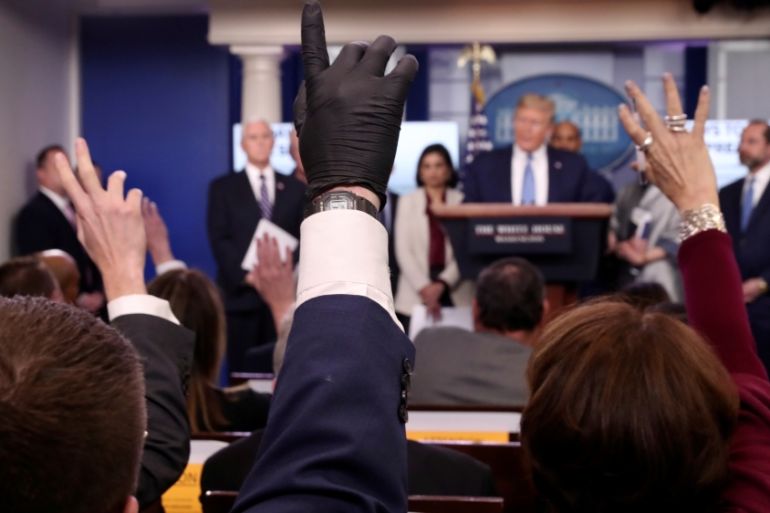US considers airline bailouts to ease COVID-19’s economic impact
Airlines for America said the industry needs $50bn to survive.

The United States and other rich countries need to start spending their way out of the coronavirus crisis, White House advisers, the International Monetary Fund (IMF) and business groups said on Monday, amid growing market panic about the pandemic.
But they are divided about what measures would be appropriate. Proposals range from rolling back payroll taxes to increasing government-lending guarantees to sending $1,000 cheques to every American. This comes as Airlines for America said the industry needs $50bn to survive.
Keep reading
list of 3 itemsFacing ‘unprecedented’ crisis, airlines urge governments to help
US Fed’s ‘desperate’ move unnerves global markets
Global markets moved sharply lower on Monday after a drastic move by the US Federal Reserve to cut interest rates to near-zero failed to assuage growing panic about the outbreak and its effect on business revenues and supply chains.
IMF Managing Director Kristalina Georgieva said pressure was growing by the hour for strong, coordinated fiscal stimulus to limit the damage from the fast-spreading outbreak.
Harry Broadman, managing director of Berkeley Research Group and a former senior US trade official, said “a real abyss” loomed if the executive and legislative branches did not soon do “something economically meaningful on the fiscal side”.
Leaders of the G7 countries said on Monday that they are making their response to the coronavirus pandemic a priority and will coordinate public health measures to help stabilise the global economy.
More than 174,100 people have been infected by the coronavirus across the world and 6,684 have died, with cases and deaths outside China overtaking those in the country where the outbreak began, according to a Reuters news agency tally.
Payroll tax cuts
The US could pump $800bn or more into the economy to minimise damage from the coronavirus outbreak if Congress passes a payroll tax holiday through year-end, White House economic adviser Larry Kudlow told reporters on Monday.
US President Donald Trump has been advocating for the payroll tax to be suspended through the end of the year, a move that would give employees and businesses each about 7 percent of gross employee income per pay period, but would punch a $1-trillion hole in Social Security and Medicare budgets.
“We have an enormous fiscal plan. It’s at least $800bn and maybe more,” Kudlow said, adding that $400bn in fiscal assistance was already in the pipeline.
The US Chamber of Commerce on Monday urged Trump and top leaders in the US Congress to cancel all payroll taxes paid by employers for the months of March, April and May; pass new legislation to expand and streamline loan programmes for small businesses and; provide loans and loan guarantees to employers with more than 500 employees experiencing significant revenue loss as a result of the outbreak.
A US House bill that includes small business loans and food security assistance was being held up on Monday on a technicality.
US Senator Mitt Romney, a Utah Republican, on Monday, proposed an expanded bill that would give every adult American a $1,000 cheque and defer student loan payments for recent college graduates.
Cash for airlines
Airlines for America, the trade group representing American Airlines, United Airlines Inc, Delta Air Lines Inc, Southwest Airlines Co and others, said the industry needs $25bn in grants, $25bn in loans and significant tax relief to survive. They also seek tax relief that could be worth tens of billions of dollars through the end of at least 2021.
Airlines said they further required a package of $8bn, equally divided in grants and loans for cargo carriers. Airports meanwhile are seeking at least $10bn in emergency government assistance, sources told Reuters.
“We have to back the airlines – it’s not their fault,” US President Donald Trump said during a news conference at the White House on Monday afternoon.
“We’re going to be helping them very much,” Trump added.
The pain was felt around the globe, with European carriers making unprecedented cuts to flights, costs and staffing while stepping up calls for emergency aid. South America’s largest carrier, LATAM Airlines Group, cancelled 90 percent of its international flights as demand collapsed.
The US airlines warned that without action, all of their members could run out of money by year-end – and even sooner if credit card companies stared withholding payments. Without action soon, airlines could take further urgent actions to furlough thousands of workers.
Delta Air Lines Inc, American Airlines Group Inc and United Airlines, the three-largest US airlines, are in talks with the US government about potential assistance.
Kudlow told Fox Business news channel that administration officials would talk to senators on Monday about the industry.
“We don’t see any of the airlines failing. But if they get into a cash crunch we’re going to try to help them. We’re consulting with the House and Senate to see what works. And, of course, the Treasury Department and the Fed have enormous powers on this.”
He added he sees the aid as “a liquidity fix, not a bailout”.